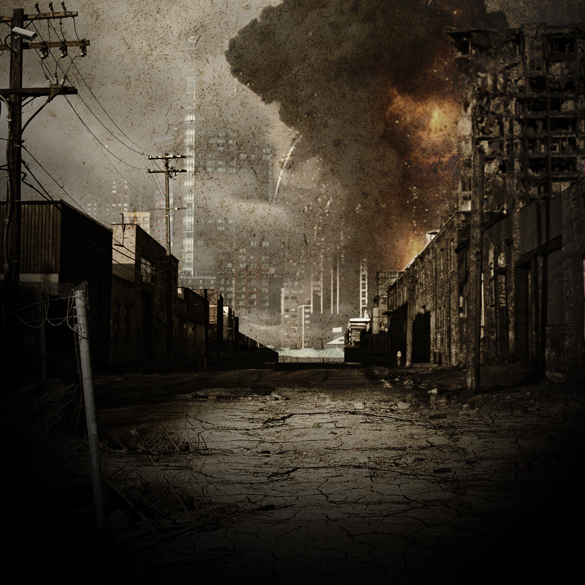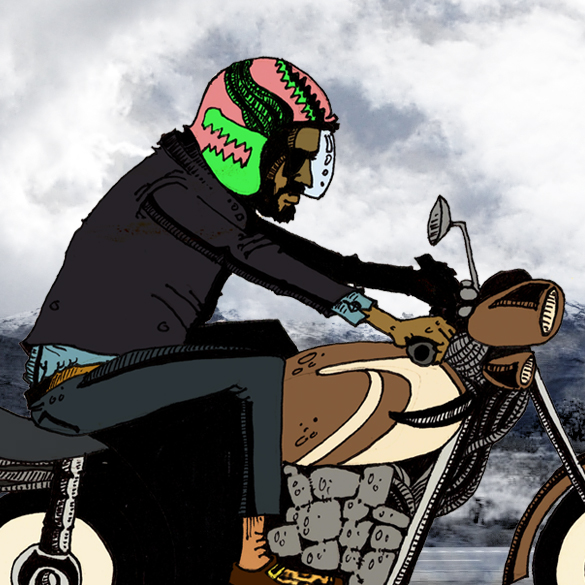In the morning before the argument he went walking. It had been one of those fine February days, when the residing chill sharpens every line and the clear blue sky speaks of the coming summer. The tide was on its way out when he reached the beach, and the sun’s rays hit the glistening stones and speared his eyes, until it had seemed the whole beach was made of light.
As he walked, a shine of red among the scattered pebbles drew his attention. He knelt and picked up the rock. It was smooth and pleasing to the touch, and its subtle shades of red were bound by intricate veins of quartz that seemed to flash patterns and languages of stone before his eyes. It was very beautiful. He slipped it into one of his pockets.
He looked out over the sea. The clear air and smooth sea made it seem as if he could see forever. He squinted, and could see the distant clouds curving over the horizon.
***
The argument, like so many of the others, began as an amiable discussion. The subject, of course, never changed. They danced around it in all of their conversations; shafts of thinly veiled allegory thrown, mockingly, as if a laugh disarmed the sharp points.
She believed; he didn’t. It was as simple as that. Or so he would say, trying to break down the disagreements into quantifiable chunks that he could digest at will. But she would refuse to be quantified.
– How can you be so sure that you understand what I believe well enough to refute it?
This time, it began with a silly quip he had made about “unintelligent design.” Her counter, for some reason, bothered him.
– Well, it designed you, didn’t it? It can’t be all that bad.
A joke, said with a smile that invited a reply in kind; an unconscious attempt to diffuse the situation. But he thought he saw smug satisfaction.
– How can you say that? Can you honestly look at the world today and think it’s the product of any intelligence? It’s mere chaos! One man kills someone and goes to jail. Another kills thousands in unnecessary wars and is remembered as a saint. It’s not free will, it’s just a lack of justice. A stone falling down a slope will take a slightly different path each time. There is no repetition. God is just an attempt to explain away that chaos, to pretend that there’s some kind of reason or pattern behind it all. But you’re deluding yourself.
He was becoming frustrated, incoherent.
– But I’ve seen patterns. Just because you don’t see a reason doesn’t mean there isn’t one.
– Show me your “reasons.” Describe them to me, if you can.
– But you already know I’m not going to do that. My reasons come from my life, my experience. I can’t explain them to anyone.
Again, he saw complacency. How can a belief be tested if you can’t show it to anyone? And how can the truth be found without the testing of beliefs? Without seeing? Hearing? Touching?
This time, the argument turned nasty shockingly fast. There was no shouting – merely cold smiles and harsh sarcasm. It wouldn’t stop, and neither of them really tried to stop it. All the bile poured out, but it wouldn’t wash away: it hung around them in a fog of bad memories and forced them to think of all the small things, the minuscule grievances.
If it hadn’t been in a restaurant it mightn’t have been so bad. He could have stormed off, and forgotten what happened somewhere else. She could have taken a few deep breaths and convinced herself that he hadn’t really meant any of it. But it was in a restaurant. Caught between the indifferent glances of strangers and the strange demands of etiquette, they remained, fuming, waiting for the bill, as the scene was etched into their memories.
***
And so, after leaving the restaurant, he went walking again. He walked hard, pushing the path away from underneath him as if to leave the earth and all its pain behind. And he found himself by the beach again, without plan or intention.
He slowed to a stroll. The loose stones rattled around his feet. The water, cloaked in translucent mist, washed at the shore, and the moon made the rolling pebbles shine. A familiar gleam of red caught his eye from within the surf.
He waded in, not caring about his shoes or trousers. He plunged his hand into the foam, and pulled out the beautiful stone. It was the same one he had found that morning, without a doubt – what a wonderful coincidence. He studied the glistening patterns of crystals on the blood red rock, losing himself in the trivial pursuit.
But.
But wait.
And now the thought came, pounding like the waves, again and again.
He had brought the stone home this morning, taken it out of his pocket, left it on to his desk. Where it still lay.
The wind suddenly swelled, and whipped the waves into a frenzy.
But there was no difference – this was the same stone.
A repetition.
Reoccurrence.
He stood there for some time, knee-deep in the water, oblivious to the crashing waves. Not thinking, merely looking out to the horizon. But he couldn’t see – the mist shrouded his sight.
After an immeasurable period, he shook his head, turned, and walked out of the water. Before he left the beach, he stopped and flung the stone out to sea.
He stumbled into bed that night, not looking at the stone that rested in the shadows on his desk. In the morning she called him, but he interrupted to apologize first.
The very beautiful red stone lay on his desk, unnoticed for months, until a guest commented on its strangeness. By then, he couldn’t remember where he had found it.
—
Samuel Mardirosian lives in Dublin, Ireland where he studies at Trinity College. He is originally from New York.



